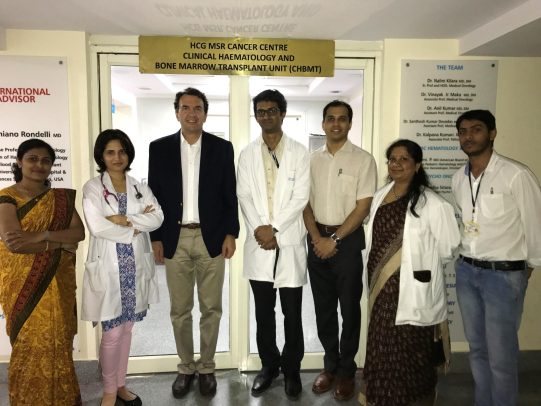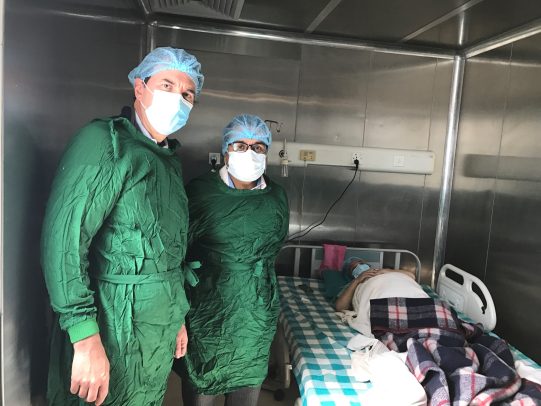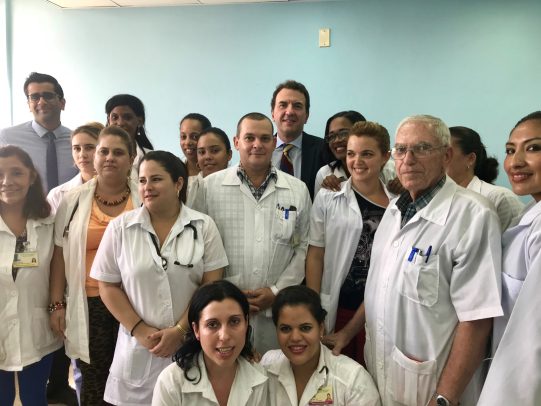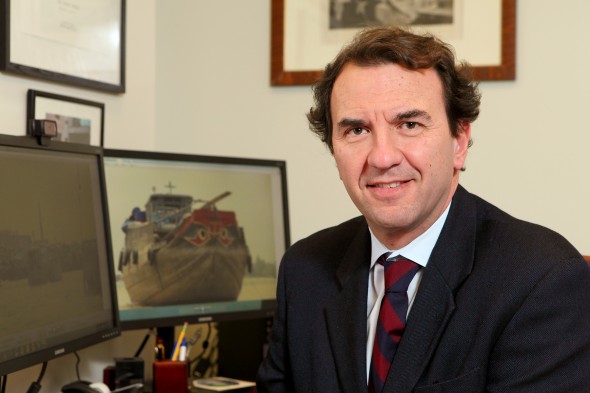Global transplant program celebrates 10 years
For more than 10 years, the Global Blood and Marrow Transplant Program at the University of Illinois Chicago College of Medicine has been advancing the use of stem cell transplantation to cure blood cancer and nonmalignant severe blood diseases around the world.
Recently, the American Society of Transplantation and Cellular Therapy presented its 2022 Public Service Award to UIC’s Dr. Damiano Rondelli, the Michael Reese Professor of Hematology and head of the division of hematology and oncology at the UIC College of Medicine and director of the Blood and Marrow Transplant Program at UI Health. The award was granted in recognition of Rondelli’s work pioneering new lifesaving treatments for patients with blood disorders like leukemia and sickle cell disease, and for his years of dedication to building blood and marrow transplant capacity in low- and middle-income countries through UIC’s Global BMT Program.
UIC today discussed the Global BTM Program with Rondelli:
When and why was the Global BMT Program started? Where did the inspiration come from?
In 2011, Dr. Binay Shah was a UIC graduating fellow in hematology/oncology, originally from Nepal and founder of a foundation supporting medical education, the Binaytara Foundation, and invited me to join him on a trip to Nepal hospitals to give lectures on blood malignancies and BMT. There I could see how many patients needed transplants and how difficult it was to treat patients with blood diseases in Nepal, where there were no trained physicians. In fact, most of the patients were treated not by hematologists, but by radiation therapy or oncology doctors with old-fashioned protocols and insufficient diagnostic capacity.
Upon returning from that trip, a Nepalese doctor who had trained in hematology in China and then in BMT in India, contacted me asking to help him establish BMT in a public hospital in Kathmandu. That was the beginning, in 2012. The first patient was transplanted there in 2016, and after 10 years of partnership between UIC and Civil Service Hospital, Nepal has a state-of-the-art public BMT Program that has already done over 120 transplants. After the initial work with Nepal, other centers reached out to me, and I have been happy to grow this initiative and apply many lessons learned in Nepal in other countries.
What stands out in your memory about the first hospital you worked with?
In every place where I go, I find it very important to make rounds in the ward where hematology patients are treated. At Civil Service Hospital in Kathmandu, Nepal, which was the first hospital that I visited and where I have been going twice a year, I remember being surprised at seeing that bed tables next to each patient’s bed were full of chemotherapy vials still closed. Then I was told that patients had to buy themselves, in cash, the prescribed chemotherapy from outside pharmacies and bring them to the hospital.
The American Society of Transplantation and Cellular Therapy award announcement mentioned your work in Cuba, Nepal and Ukraine specifically – what is unique about the work in these countries?
Over 10 years, my program has connected with many hospitals in Asia, Africa, Central and South America and Europe. I imagine that ASTCT emphasized countries that had special international attention, such as Cuba (Hermanos Ameijeiras Hospital in Havana), which is mostly not accessible to people in the U.S., or Ukraine (National Cancer Institute in Kyiv), which is now suffering a terrible war. The Civil Service Hospital of Kathamandu in Nepal is often in my stories, and we recently published a manuscript describing the implementation steps that we took, as well as the results of the initial 66 transplants. However, other sites, such as Ramaiah University in Bangalore (India), or the Universidad Mayor de San Andres in La Paz (Bolivia), or the University of Lagos and the Medical College of Ibadan in Nigeria, or the University of Ioannina in Greece, have also made meaningful steps to build capacity and work toward starting BMT.
After 10 years of working with hospitals from around the world, what do you know now that you didn’t know when you started the program?
I certainly learned a lot from colleagues around the world who taught me that the main goal is to pick the best treatment that is affordable to most patients, rather than to pursue the most efficacious strategy that only a few could afford and have by traveling abroad. Then, I learned how important it is to personally engage everyone in these hospitals, from administrators to nurses, staff, laboratory people and advocates, for me to help the physicians to be supported within their own institutions.



It goes without saying that the Global BMT Program has helped to save many lives outside the U.S. Are there other ways that the program makes a difference, either here at home or abroad?
I like to mention two impactful outcomes of the Global BMT project.
The first is the training program that we started in 2018 by hosting in Chicago five physicians from low- and middle-income countries for two months, to follow an intense curriculum of observership in our hospital, in our outpatient setting, in the stem cell and HLA labs, participating in weekly planning and quarterly quality management meetings, as well as having over 10 dedicated lectures on all the aspects of BMT from multiple faculties. Because of COVID-19, the GlobalBMT Training was then changed into a remote three-month series of lectures that had 32 participants from all over the world. In the fall of 2022, we will restart the in-person training, and we could accept only five of the 10 applicants. Among these, we are very glad that we will have a physician from Kyiv, where I hope we will be able soon to go back again and restart our project. Then we will have trainees from India, Bolivia, Tanzania and Argentina.
The second is that thanks to our project, the American Society of Transplantation and Cellular Therapy asked me four years ago to start a task force and then a committee to address how to facilitate the participation of physicians and researchers from low- and middle-income countries in their meeting and training initiatives by offering low fees membership and establishing a dedicated session at the annual meeting to present the work from BMT centers in low- and middle-income countries.
How have recent events, like the COVID-19 pandemic and the war in Ukraine, impacted the Global BMT Program? Or, how has the program responded to these events?
I already mentioned about the remote training during COVID-19. However, one of the main assets of the Global BMT Program has been, from the beginning, a nonstop connection via WhatsApp with every international partner. Hundreds of messages have come my way at any time of the day or night, asking my advice on treatment choices, diagnostic tests, scientific papers, etc. During COVID, we added also questions on patients undergoing BMT and having COVID exposure. Nobody really had good answers, and we all learned together through our experiences and local guidelines.
When the Russian invasion started in Ukraine, I immediately connected via WhatsApp with my colleagues hoping to give my support. The network of people interested in helping BMT in Ukraine has now established a task force, mostly with people in Ukraine, Germany, Spain and a couple of us from the U.S., that holds weekly meetings to discuss patients, supply of medications for Ukrainian hospitals, and arrangements in Poland for Ukrainian refugee patients.
What’s next for the Global BMT Program?
The seed that was planted is growing into a small tree, and more countries have already reached out. I hope we will have time and resources to support the growth of more BMT leaders in low- and middle-income countries, facilitate local training programs, engage also other constituents of BMT such as public health researchers, clinical trial investigators, pharmacists and nurses in a comprehensive Global BMT Program based at UIC.

